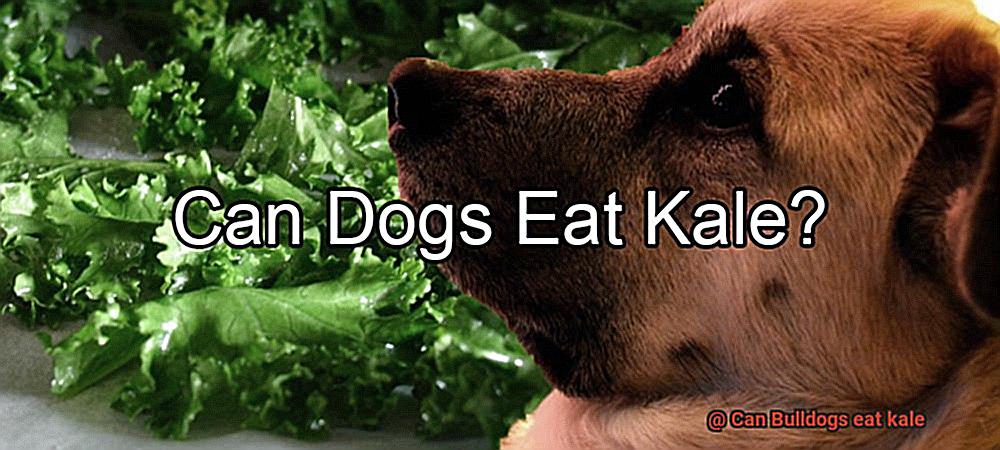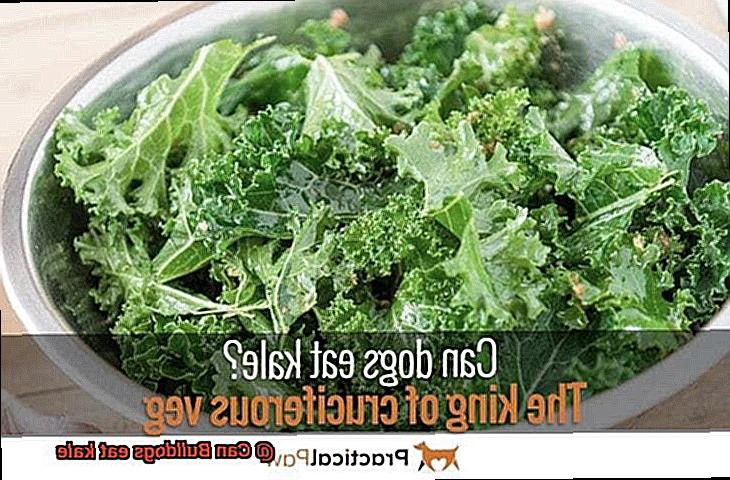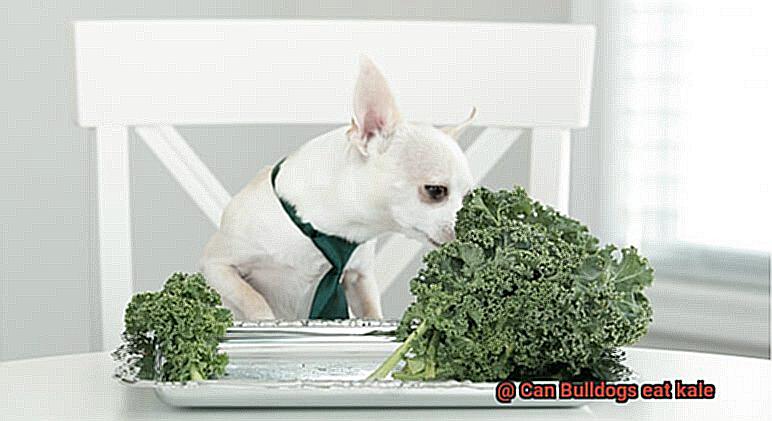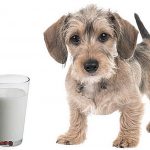Can Bulldogs eat kale?
Ever wondered if kale is a safe snack for your furry friend? Kale, the superfood that’s all the rage among humans, is loaded with vitamins A, C, and K, plus calcium and fiber.
But can Bulldogs enjoy this leafy green goodness too? In this blog post, we’ll dig into whether kale is a healthy addition to your Bulldog’s diet or if it’s better off on your plate.
So let’s get into it and find out if Bulldogs can chow down on kale like champs.
Nutritional Benefits of Kale for Bulldogs
Contents
- 1 Nutritional Benefits of Kale for Bulldogs
- 2 Potential Health Risks Associated With Feeding Kale to Bulldogs
- 3 How to Introduce Kale Into Your Bulldog’s Diet Safely
- 4 The Best Way to Cook Kale for Dogs
- 5 Tips for Avoiding Overfeeding Kale to Bulldogs
- 6 Signs of Allergic Reactions or Digestive Upset After Eating Kale
- 7 Conclusion
Bulldogs are lovable companions known for their unique appearance and gentle nature. However, like all dog breeds, Bulldogs have specific nutritional needs that require careful consideration. One nutrient-packed vegetable that can provide a multitude of health benefits for Bulldogs is kale. In this article, we will explore why kale should be included in their diet and how it can contribute to their overall well-being.
Powerhouse of Vitamins and Minerals:
Kale is a nutritional powerhouse, boasting an impressive array of vitamins and minerals essential for Bulldogs’ optimal health. Vitamins A, C, and K found in kale support a robust immune system, promote healthy skin and coat, and contribute to proper blood clotting. Furthermore, minerals like calcium, potassium, and iron help maintain strong bones, aid in muscle function, and prevent anemia.
Antioxidant Boost:
Just like humans, Bulldogs can benefit from the powerful antioxidants found in kale. Beta-carotene and lutein are two key antioxidants that help combat oxidative stress and inflammation in their bodies. By incorporating kale into their diet, Bulldogs can potentially improve cardiovascular health and reduce the risk of chronic diseases.
Digestive Health Savior:
Bulldogs are notorious for their sensitive stomachs, often plagued by digestive issues such as constipation. Enter kale. This leafy green is packed with fiber, which aids digestion by promoting regular bowel movements and preventing constipation. Not only does it keep their digestive system running smoothly, but the fiber content in kale also helps Bulldogs feel fuller for longer, assisting in weight management.
Weight-Wise and Calorie-Conscious:
Maintaining a healthy weight is vital for Bulldogs to prevent obesity-related health problems. Thankfully, kale is a low-calorie food choice that allows them to enjoy a satisfying meal without packing on the pounds. By incorporating kale into their diet, you can help your Bulldog maintain a healthy body weight, reducing the strain on their joints and overall well-being.
Joint Health Support:
Bulldogs’ stocky build puts them at higher risk for joint issues, such as arthritis. The anti-inflammatory properties present in kale may help ease joint pain and reduce inflammation. By regularly including kale in their diet, you can potentially improve their mobility and enhance their quality of life.
Kale is an excellent addition to a Bulldog’s balanced diet, offering a plethora of nutritional benefits that can support their overall health and well-being. However, it’s crucial to remember that kale should be part of a well-rounded diet and not the sole source of nutrition.
Always consult with a veterinarian or canine nutritionist to determine the appropriate amount of kale for your Bulldog based on their individual needs.
With proper preparation and moderation, kale can be a nutritious and delicious treat for your beloved Bulldog companion.
Potential Health Risks Associated With Feeding Kale to Bulldogs
Today, we’re diving into a topic that’s been buzzing around the doggy world lately – the potential health risks associated with feeding kale to our beloved Bulldogs. While kale has gained a reputation as a superfood for humans, it’s important to understand that our furry friends have unique needs and dietary considerations.
So, let’s take a closer look at why kale might not be the best choice for our Bulldogs.
Digestive Dilemmas
Bulldogs, with their adorable squishy faces and short noses, already face challenges when it comes to digestion. Now, imagine adding kale to the mix. Kale contains compounds called glucosinolates, which can be tough for dogs to digest.
This can lead to uncomfortable gastrointestinal issues like bloating, gas, and diarrhea – something we definitely want to avoid for our Bulldogs.
Oxalate Overload
Another concern with kale is its high oxalate content. Oxalates are natural substances found in various foods, including kale. When consumed in excess, these oxalates can team up with calcium in the body and form crystals, potentially causing kidney stones or urinary tract issues. And Bulldogs already have a higher risk of developing urinary tract problems compared to other breeds – so it’s like adding fuel to the fire.
Chewing Challenges
Now, let’s talk about chewing – or should I say, the lack thereof. Bulldogs have unique jaw structures that make chewing a bit of a challenge for them. Kale, being a leafy green veggie with tough fibers, can pose a choking hazard or even block their digestive tract if not properly broken down before consumption.
But hey, don’t fret just yet. Not all Bulldogs will experience negative effects from eating kale. Some may tolerate it well without any issues. However, it’s crucial to monitor their health closely and consult with a veterinarian before introducing kale or any new food into their diet.
If you do decide to give kale a shot, here are some tips to minimize the risks:
- Cook or steam it: This helps break down those tough fibers and makes it easier for your Bulldog’s digestive system to handle.
- Remove stems and chop into small pieces: Bulldogs struggle with chewing larger pieces, so making the kale more manageable can prevent choking hazards.
And remember, always introduce new foods gradually and in moderation. This allows you to monitor your Bulldog’s response and make adjustments if needed. If you notice any negative symptoms or health issues after feeding kale, discontinue its use and consult with a veterinarian.
How to Introduce Kale Into Your Bulldog’s Diet Safely
Kale can be a nutritious addition that offers several health benefits. However, it’s important to introduce kale gradually and carefully to ensure your furry friend’s well-being. In this article, we’ll discuss how to introduce kale into your Bulldog’s diet safely, step by step.
Consult with Your Veterinarian:
Before introducing any new food, including kale, it’s essential to consult with your veterinarian. They can assess your Bulldog’s specific needs and health conditions to determine if kale is suitable for them.
Start Slowly:
Begin by offering small amounts of cooked kale mixed with your Bulldog’s regular food. This allows them to adjust gradually without overwhelming their digestive system.
Monitor for Digestive Upset:

Keep an eye out for any signs of digestive upset, such as diarrhea or vomiting. If these symptoms occur, discontinue feeding kale and consult your veterinarian.
Properly Prepare the Kale:
Remove the tough stems and chop the leaves into bite-sized pieces. Thoroughly wash the kale to eliminate any dirt or pesticides. Cooking the kale by steaming or boiling it for a few minutes will make it easier for your Bulldog to digest.
Avoid Seasonings or Oils:
Kale should be served plain and unseasoned, as seasonings, spices, or oils can be harmful to your Bulldog’s health.
Balanced Diet is Key:
Remember that kale should be part of a balanced diet and not replace your Bulldog’s regular food entirely. Consider mixing it with other dog-friendly vegetables and proteins to create a nutritious meal.
The Best Way to Cook Kale for Dogs
Are you ready to give your furry friend a superfood boost? Kale, the leafy green superhero, can provide your Bulldog with essential nutrients to support their overall health. But before you start tossing kale into their food bowl, it’s important to know the best way to cook this veggie to ensure their safety and optimal nutrition. Let’s dive right into it.
Research: Understanding the Benefits and Risks
Kale is packed with vitamins A, C, and K, as well as minerals like calcium and iron. However, raw kale can be tough for dogs to digest and may cause tummy troubles. That’s why cooking kale is crucial to break down its tough fibers and make it easier for your Bulldog to absorb all the goodness.
Steaming: The Superhero’s Preferred Method
Steaming kale is the best way to retain most of its nutrients while also eliminating any potential harmful bacteria or parasites. Simply place the kale in a steamer basket over boiling water and cover it until it wilts and becomes soft – usually around 5-7 minutes. Your Bulldog will love the tender texture.
Boiling: A Super Sidekick
If steaming isn’t your thing, boiling kale is another option. However, keep in mind that some nutrient loss may occur during this process. To boil kale, submerge it in a pot of boiling water for about 10 minutes or until it becomes tender. Remember, we want our Bulldog to get the most nutrients possible.
Cool and Chop: Safety First
After cooking, let the kale cool down before serving it to your Bulldog. This prevents any burns or discomfort from hot food. Additionally, chop or puree the cooked kale into smaller pieces to prevent choking hazards. Safety always comes first.
No Villainous Seasonings
While you may be tempted to add seasonings like garlic or onions to enhance the flavor, these can be toxic to dogs. Stick to plain, cooked kale without any additives or seasonings. Your Bulldog will still enjoy its natural taste.
Consult with Your Veterinarian
Before introducing kale into your Bulldog’s diet, it’s essential to consult with your veterinarian. They can provide specific guidelines based on your dog’s individual needs and health condition. Remember, every superhero has their own unique powers.
Tips for Avoiding Overfeeding Kale to Bulldogs
Providing a well-balanced diet is essential for the overall health and well-being of your beloved Bulldog. While kale can be a nutritious addition to their meals, it’s crucial to understand the importance of moderation and balance.
In this article, we will explore the benefits of kale, potential risks of overfeeding, and provide tips on how to incorporate this leafy green vegetable into your Bulldog’s diet safely and effectively.
Understanding the Nutritional Needs of Bulldogs:
Bulldogs have specific dietary requirements that differ from other dog breeds. They need a balanced combination of protein, carbohydrates, fats, vitamins, and minerals to stay healthy. While kale is packed with vitamins A, C, and K, as well as calcium and iron, it should not replace the essential nutrients provided by commercial dog food.
The Benefits of Including Kale in Moderation:
Incorporating kale in moderation can be beneficial for Bulldogs. It is a superfood that supports immune health and promotes overall well-being. The vitamins and minerals found in kale can help boost their immune system and keep their bones strong. However, it’s crucial to remember that kale should only make up a small portion of their overall diet.
The Risks of Overfeeding Kale:
Overfeeding kale to Bulldogs can lead to digestive issues such as gas, bloating, and diarrhea due to its high fiber content. Additionally, kale contains oxalates that may interfere with calcium absorption and potentially contribute to bladder or kidney stones. Therefore, it’s important not to make kale a significant portion of their meals.
Consult with Your Veterinarian:
Before introducing kale or any new food into your Bulldog’s diet, consult with your veterinarian. A vet can provide personalized guidance based on your Bulldog’s specific needs, age, and any existing health conditions. They will help you determine the appropriate amount of kale to include in their diet and ensure their overall nutritional needs are being met.
Moderation is Key:

Feeding kale in moderation is essential for Bulldogs. While it can be a healthy addition, it should not replace other essential components of their diet. Experts recommend feeding kale as an occasional treat or supplement to their regular meals. This way, you can provide them with the benefits of kale without risking overfeeding or potential health issues.
Signs of Allergic Reactions or Digestive Upset After Eating Kale
Kale, with its vibrant green color and numerous health benefits, has become a popular addition to human diets. But what about our furry friends? Can bulldogs indulge in this trendy superfood without any consequences? Well, the truth is, kale can be a superfood sidekick for bulldogs, but it’s important to be aware of potential allergic reactions or digestive upset that may occur.
Signs of an Allergic Reaction
Just like humans, dogs can have allergies too. While allergic reactions to kale are relatively rare in dogs, they can still happen. So how can you tell if your bulldog is having an allergic reaction after eating kale? Look out for these signs:
- Excessive scratching or licking: If you notice your bulldog scratching their paws, face, or body excessively after enjoying some kale, it could be an indication of an allergic reaction.
- Skin irritation: Keep an eye out for redness, rashes, or hives on your dog’s skin. These can be signs of an allergic reaction as well.
Digestive Upset: The Bulldog Tummy Troubles
Aside from allergic reactions, some bulldogs may experience digestive upset after consuming kale. This can manifest in several ways:
- Vomiting: If your bulldog starts heaving and expelling the contents of their stomach shortly after eating kale, it could be a sign of digestive upset.
- Diarrhea: Loose, watery stools are another common symptom of digestive upset. If you notice changes in your bulldog’s bowel movements after eating kale, it’s best to keep an eye on them.
When to Seek Veterinary Assistance
While mild allergies or digestive upset may resolve on their own, it’s important to be vigilant and seek veterinary assistance if you notice severe symptoms such as:
- Difficulty breathing: If your bulldog is struggling to breathe or wheezing, it’s crucial to seek immediate medical attention as this could be a sign of a severe allergic reaction.
- Swelling of the face or throat: Swelling of the face or throat can also indicate a severe allergic reaction. In these cases, time is of the essence, and you should rush your bulldog to the vet right away.
Prevention is Key
To prevent allergic reactions or digestive upset, it’s always best to introduce new foods slowly and in small amounts. This allows your bulldog’s body to adjust and reduces the risk of adverse reactions. If your bulldog has a known allergy or sensitivity to other cruciferous vegetables like broccoli or cabbage, it’s possible they may also have a reaction to kale. In such cases, it may be best to avoid feeding kale altogether.
sFNvR-VLDS8″ >
Conclusion
In conclusion, Bulldogs can absolutely indulge in the vibrant and nutrient-packed goodness of kale. This leafy green powerhouse not only tantalizes their taste buds but also showers them with a plethora of health benefits. From bolstering their immune system to promoting smooth digestion and even potentially easing those pesky joint pains, kale is truly a superfood for our beloved Bulldogs.
However, as with any new addition to their diet, it’s crucial to introduce kale gradually and in moderation. This cautious approach helps prevent any tummy troubles or unwelcome allergic reactions from spoiling the fun. Remember, we want our furry friends to enjoy every bite without any discomfort.
When it comes to serving up this green delight, consulting with a trusted veterinarian or canine nutritionist is paramount. They will guide you on the appropriate amount of kale that suits your Bulldog’s unique needs. While kale can be a fantastic supplement to their regular meals, it should never replace the complete and balanced diet they require for optimal health.
To ensure your Bulldog’s safety while savoring kale’s goodness, consider cooking or steaming the vegetable. This gentle process breaks down its tough fibers, making it easier for our four-legged friends to digest. Additionally, removing stems and chopping into small pieces minimizes any potential choking hazards that may put a damper on their dining experience. And remember, keep it plain and unseasoned – no additives or oils necessary.
By adhering to these guidelines and keeping a watchful eye on your Bulldog’s response, you can confidently incorporate kale into their diet as an irresistible treat that nourishes both body and soul.
Each Bulldog is as unique as their adorable snorts and wrinkles, so always tailor their dietary choices according to their specific needs under the guidance of veterinary professionals who truly have their best interests at heart.




